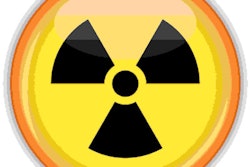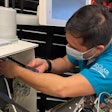
A team of interventional radiologists has written a modified procedure protocol to help their peers navigate patient care scheduling during the COVID-19 pandemic, according to an article published June 3 in the American Journal of Roentgenology.
Interventional radiology procedures are performed under CT, ultrasound, fluoroscopy, or MRI guidance and include fluid aspiration, drainage catheter placement, percutaneous biopsy, and tumor ablation, said lead author Dr. Ghaneh Fananapazir of the University of California, Davis in a statement released by the AJR.
All of these "require appropriate donning and doffing of personal protective equipment by every member of the IR [interventional radiology] team -- physician, trainee, nurse, technologist -- and some procedures may require admitting the patient for management of postprocedure complications, necessitating a hospital bed and auxiliary resources," the statement said.
Fananapazir and colleagues proposed the following tiered framework for determining treatment scheduling:
- Urgent procedures (i.e., cholecystostomy, abscess drainage, biopsy for lymphoma)
- Procedures that should be performed within two weeks (i.e., organ biopsy for suspected malignancy)
- Procedures that should be performed within two months (i.e., ablation of fast-growing lesions)
- Procedures that can safely be delayed for two months (i.e., liver biopsy for staging of fibrosis)
- Procedures that can safely be delayed for six months (i.e., fine-needle aspiration of thyroid nodule)
"Each procedure request must be triaged into a tier on a case-by-case basis because clinical circumstances can dictate one procedure as urgent, whereas different clinical data may render the same procedure safe to delay," the group said.



















